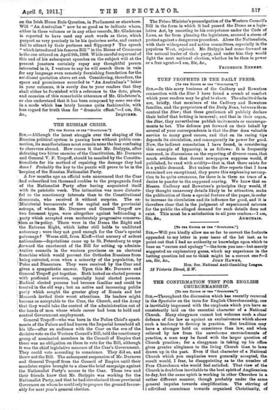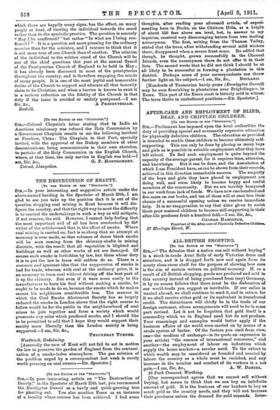TEE CONFIRMATION TEST FOR ENGLISH CHURCHMANSHIP.
[TO THIL EDITOR Of TEM "SPECTATOR"]
Sin,—Throughout the discussion which has recently recurred in the Spectator on the tests for English Churchmanship, one is inevitably impressed with the emphasis which you have so consistently laid on the essential character of a National Church. Many clergymen cannot but welcome such a clear defence of the law as against an exclusiveness which shows such a tendency to develop in practice. But tradition may have a stronger hold on conscience than law, and when relieved by law from the unwelcome encroachments of practice, a man may be faced with the larger question of Church practice ; for a clergyman in taking up his office gives greater allegiance to the living Church than to laws drawn up in the past. Even if that character of a National Church which you emphasize were generally accepted, the result would, I fear, be disappointing as to the number of Free Churchmen who would feel satisfied. That view of the Church is doubtless inevitable to the best spirit of Anglicanism to-day, but the same spirit is working in other Churches in a rather different manner, though probably under the same general impulse towards simplification. The stirring of i ndividual conscience towards organised Christianity, of
which there are happily many signs, has the effect, on many people at least, of turning the individual towards the creed rather than to the symbolic practice. The question is scarcely " May I be confirmed? ' but rather " In what am I being con- firmed ? " It is a question not more pressing for the ordinary member than for the minister, and I venture to think that it is not more true of one Church than of another. The relation of the individual to the written creed of the Church will be one of the chief questions this year at the annual Synod of the Presbyterian Church of England to be held in May ; it has already been discussed in most of the presbyteries throughout the country, and is therefore engaging the minds of many people. It is one of the most joyful and honourable duties of the Church to support and educate all that honestly claim to be Christian, and when a barrier is known to exist it is a serious reflection on the fidelity of the Church in that duty if the issue is avoided or unduly postponed—I am











































 Previous page
Previous page